Midweek Review
The Making of Modern Ceylon
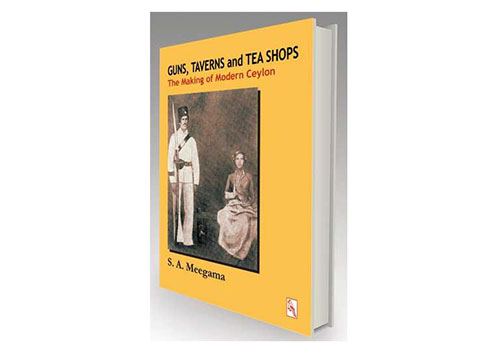
Author: S A Meegama
Reviewed By
Gamini Seneviratne
The title given above is one of two on the cover of this book by Dr. Ananda Meegama. The other is GUNS, TAVERNS and TEA SHOPS. He has left out the principal feature of British incursions into other people’s territories: PERFIDY. Perhaps he took that as a given.
In what is clearly a work that has taken much labour over a long period of time to accomplish, Dr. Meegama gives ‘academics’ everywhere, and professional historians in particular, a lesson in what true scholarship not just involves but literally means.
It is a matter for surprise that any of them would confess the conditioning that underpins their representation of ‘histories’ – as Dr. Michael Roberts recently did. The following remarks may be taken as a pointer to how ‘history’ comes to be constructed.
In Michael’s own account, the reports of ‘VE-Day’ had so affected him that they had brought tears to his eyes. But as he goes on it becomes evident that his is not just a childhood love for the Brits who controlled Koggala, it involved a reconstruction of the major events of that war. “The main reason”, he says, “for the collapse of the Hitler regime, was probably the disasters they faced in the east, in battling the USSR, though one must also note the weight brought to bear in both fronts by the entry of the USA –inclusive of its supplies to Russia”.
Well, that’s the first I have heard of the role of the USA in the decisive battles of Stalingrad in 1942 (shortly after the Japanese attack on the American Pacific fleet in Hawaii) – an extended encounter that signalled the defeat of Nazi Germany.
Naturally he does not attempt a reconstruction of atrocities, perpetrated by his heroes and he makes no mention of Hiroshima and Nagasaki – which happened 75 years ago. A new take on that horrendous crime was tried out last week: Truman’s grandson piped up with the notion that “grandpa had felt he had to do it”. But why Japan and why at a moment when it was ready to surrender? As was noted in Michael Ondaatje’s ‘The English Patient’, “they” ‘would not have dropped those atomic bombs on the primary enemies of ‘the Allies’ – Germany and Italy. The Japanese, after all, were mere “orientals”.
As his ‘findings’ on the Brits’ theft of our prosperous highlands (“waste lands”) would show, Dr. Roberts’ afore-mentioned bias extends to his ‘histories’ of atrocities committed by the Brits here. He has also ‘found’ around the time the Brits were intent on jailing the national leaders, D B Jayatilaka and others, that the Sinhalese were guilty of carrying out a “pogrom” on the Muslims. Such prejudice runs in the teeth of the judgement on the matter given by Dr. P E Peiris, a true historian cum judge. A brief account of that op by Jayantha Gunasekera, PC, appeared in a Sunday newspaper last month. Dr. Roberts is welcome to comment on that.
In the context of on-going exertions by the USA, to occupy Sri Lanka, it would be well at this point to recall the words of Franz Fanon: ” And, – this would serve to underline another fundamental truth articulated by him. It relates not only to the rationale given for “economic theory” that has long served the corporate appropriation of resources everywhere but more immediately to the rip-off being sought right here through the MCC and SOFA’s “in-your-throat” betrayals – “ With ‘the MCC the government of the robbed is required to make possible, approve and protect the robbery.
In that note on “VE Day” Michael also sketches some of his antecedents but they are such as would not quite fit a “Galle Burgher” such as Professor Lyn Ludowyk. Ludowyk retired to England (where he produced, on invitation, a standard text on “Understanding Shakespeare” as well as the definitive Cambridge editions of several plays by Shakespeare). What is relevant here however are his histories of his native land, beginning with ‘The Footprint of the Buddha’ and ‘The Story of Ceylon’ – accounts that have passed our professional history-writers by.
Among the latter were the Jesuit Priest, Fr. S G Perera’s purported “History of Ceylon for Schools” designed to plant versions of his choice in the mind of schoolchildren. The primary object of such work was a continuation of the account
I had a kind of encounter with what I think was his final work, “Ceylon Today and Yesterday” by Dr.G C Mendis a historian, highly regarded by the fraternity who covered ‘Ceylon’ from its early days through to British times. Barely out of school and recruited to the publishing department of Lake House as a proof-reader my duties soon came to include ancillary tasks such as checking translations Sinhala-English / English-Sinhala. The head of that department was E P Mendis, the author’s brother and he paid me the high complement of asking me for my comments on that work. I pointed out several instances of Dr. Mendis’s Anglo-Christian bias in his account of both our yesterday’ and ‘today’ which he came to amend before publication.
Dr. Meegama specialized in statistics and in its applications in economics and econometrics. This work retains a bit of the overlay of the shibboleths that govern those fields of a bankrupt academia and have served the pervasive project of ‘capitalist’ exploitation of the resources of the world.
Another of Dr. Meegama’s books had covered Famine, Fevers and Fears: The State and Disease in British Colonial Sri Lanka – a subject that receives due attention in the present work as well.
As this book makes clear, ‘the making of modern Ceylon’ involved the destruction of peasant agriculture, the plunder of the temples, the denudation of our forests and the spread of a general culture of lawlessness. Sound familiar? Today we have the monstrous intrusion mis-named ‘tourism’ which is provably as rapacious and destructive of native life and well-being as the colonialism of the years covered in this book contrived to impose on us. The following poem by David Craig, who was on the staff at Peradeniya and was not long after to become Professor of Creative Writing at Lancaster, outlines that process. It appeared in the Heinemann collection of ‘Poems from India, Sri Lanka, Malaysia and Singapore’, under ‘Sri Lanka’.
‘The Country’
And such a beautiful country – not too hot,
Not too big, not like India.
You hardly see a beggar – are there any?’
And the beaches (unspoilt) and the palm trees –
Paddy fields run round the contours,
Water shines on the terraces.
Or climb to the cool resort where rich Victorians clipped
A perfectly British golf course out of the scrub,
Carving the joint on Sunday and watering the rose-garden.
How did they pay for it all? The country paid for it,
The red soil bled for it, the wounds
Still glare among the tea bushes.
The top-soil ebbs away to the sea,
Rivers that sparkled in the chronicles
Skulk in their pools like coffee-dregs.
Speaking of the ruthless rise of the British East India Company William Dalrymple outlines it thus: “The East India Company was established in London in the time of Shakespeare and from the 1700s it created the greatest corporate takeover of all time. Seeking to dominate the global trade in spices, textiles and eventually opium, a group of white men eventually became the military and political rulers of India. They ruled over hundreds of millions of people, and because they were a public company, they felt no responsibility to the people they ‘governed’, only to their London shareholders.
Eventually they created famine, chaos and bled the country dry.”
‘The ‘historical record’ is fed by many voices, some of which are used by those who write them up. While Dalrymple is accepted as a historian by persons who claim such accreditation for themselves, Mark Tully, another long-time resident in India is evidently not. Of Tully’s No Full Stops in India’, The Independent, UK, took recourse to 19th century notions of ‘orientalism’, thus: “Tully’s profound knowledge and sympathy – unravels a few of the more bewildering and enchanting mysteries of the subcontinent”.
Dr. Meegama’s commentary joins the work of such a distinguished scholar as Ralph Peiris (“Asian Development Styles” et al), the narratives of such as P E Pieris, Tennakone Vimalananda, and the analyses advanced by S B D de Silva and Gerald Peiris.
Above all, Dr. Meegama has brought to our attention (that of lay persons and scholars alike) the primary records in the language of administration in ‘Modern Ceylon’, English. I was also pleased to find in it mention of The C. L. Wickremasinghe Collection of Manuscripts Relating to the Traditionary Customs of Nuwara Kalāviya. Those manuscripts were of accounts of traditional customs and oral histories gathered through Village Headmen, Vel Vidanes and the like by the then Government Agent (and the first such native CCS officer) of the North Central Province.
All in all, one would be grateful to Dr. Meegama for pointing the way to the making of a People’s History of ‘Modern’ Ceylon of the quality and orientation of Howard Zinn’s ‘People’s History of the United States’.
- News Advertiesment
See Kapruka’s top selling online shopping categories such as Toys, Grocery, Flowers, Birthday Cakes, Fruits, Chocolates, Clothing and Electronics. Also see Kapruka’s unique online services such as Money Remittence,News, Courier/Delivery, Food Delivery and over 700 top brands. Also get products from Amazon & Ebay via Kapruka Gloabal Shop into Sri Lanka.
Midweek Review
‘Professor of English Language Teaching’
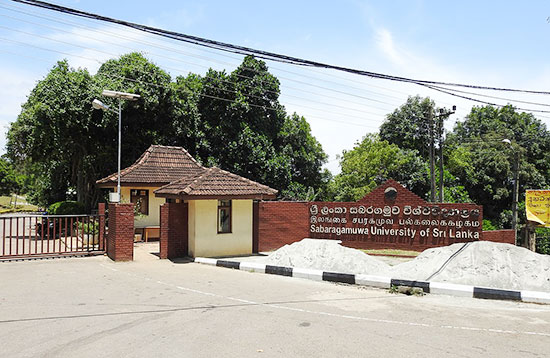
It is a pleasure to be here today, when the University resumes postgraduate work in English and Education which we first embarked on over 20 years ago. The presence of a Professor on English Language Teaching from Kelaniya makes clear that the concept has now been mainstreamed, which is a cause for great satisfaction.
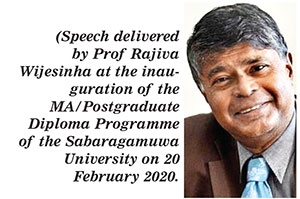 Twenty years ago, this was not the case. Our initiative was looked at askance, as indeed was the initiative which Prof. Arjuna Aluwihare engaged in as UGC Chairman to make degrees in English more widely available. Those were the days in which the three established Departments of English in the University system, at Peradeniya and Kelaniya and Colombo, were unbelievably conservative. Their contempt for his efforts made him turn to Sri Jayewardenepura, which did not even have a Department of English then and only offered it as one amongst three subjects for a General Degree.
Twenty years ago, this was not the case. Our initiative was looked at askance, as indeed was the initiative which Prof. Arjuna Aluwihare engaged in as UGC Chairman to make degrees in English more widely available. Those were the days in which the three established Departments of English in the University system, at Peradeniya and Kelaniya and Colombo, were unbelievably conservative. Their contempt for his efforts made him turn to Sri Jayewardenepura, which did not even have a Department of English then and only offered it as one amongst three subjects for a General Degree.
Ironically, the most dogmatic defence of this exclusivity came from Colombo, where the pioneer in English teaching had been Prof. Chitra Wickramasuriya, whose expertise was, in fact, in English teaching. But her successor, when I tried to suggest reforms, told me proudly that their graduates could go on to do postgraduate degrees at Cambridge. I suppose that, for generations brought up on idolization of E. F. C. Ludowyke, that was the acme of intellectual achievement.
I should note that the sort of idealization of Ludowyke, the then academic establishment engaged in was unfair to a very broadminded man. It was the Kelaniya establishment that claimed that he ‘maintained high standards, but was rarefied and Eurocentric and had an inhibiting effect on creative writing’. This was quite preposterous coming from someone who removed all Sri Lankan and other post-colonial writing from an Advanced Level English syllabus. That syllabus, I should mention, began with Jacobean poetry about the cherry-cheeked charms of Englishwomen. And such a characterization of Ludowyke totally ignored his roots in Sri Lanka, his work in drama which helped Sarachchandra so much, and his writing including ‘Those Long Afternoons’, which I am delighted that a former Sabaragamuwa student, C K Jayanetti, hopes to resurrect.
I have gone at some length into the situation in the nineties because I notice that your syllabus includes in the very first semester study of ‘Paradigms in Sri Lankan English Education’. This is an excellent idea, something which we did not have in our long-ago syllabus. But that was perhaps understandable since there was little to study then except a history of increasing exclusivity, and a betrayal of the excuse for getting the additional funding those English Departments received. They claimed to be developing teachers of English for the nation; complete nonsense, since those who were knowledgeable about cherries ripening in a face were not likely to move to rural areas in Sri Lanka to teach English. It was left to the products of Aluwihare’s initiative to undertake that task.
Another absurdity of that period, which seems so far away now, was resistance to training for teaching within the university system. When I restarted English medium education in the state system in Sri Lanka, in 2001, and realized what an uphill struggle it was to find competent teachers, I wrote to all the universities asking that they introduce modules in teacher training. I met condign refusal from all except, I should note with continuing gratitude, from the University of Sri Jayewardenepura, where Paru Nagasunderam introduced it for the external degree. When I started that degree, I had taken a leaf out of Kelaniya’s book and, in addition to English Literature and English Language, taught as two separate subjects given the language development needs of students, made the third subject Classics. But in time I realized that was not at all useful. Thankfully, that left a hole which ELT filled admirably at the turn of the century.
The title of your keynote speaker today, Professor of English Language Teaching, is clear evidence of how far we have come from those distant days, and how thankful we should be that a new generation of practical academics such as her and Dinali Fernando at Kelaniya, Chitra Jayatilleke and Madhubhashini Ratnayake at USJP and the lively lot at the Postgraduate Institute of English at the Open University are now making the running. I hope Sabaragamuwa under its current team will once again take its former place at the forefront of innovation.
To get back to your curriculum, I have been asked to teach for the paper on Advanced Reading and Writing in English. I worried about this at first since it is a very long time since I have taught, and I feel the old energy and enthusiasm are rapidly fading. But having seen the care with which the syllabus has been designed, I thought I should try to revive my flagging capabilities.
However, I have suggested that the university prescribe a textbook for this course since I think it is essential, if the rounded reading prescribed is to be done, that students should have ready access to a range of material. One of the reasons I began while at the British Council an intensive programme of publications was that students did not read round their texts. If a novel was prescribed, they read that novel and nothing more. If particular poems were prescribed, they read those poems and nothing more. This was especially damaging in the latter case since the more one read of any poet the more one understood what he was expressing.
Though given the short notice I could not prepare anything, I remembered a series of school textbooks I had been asked to prepare about 15 years ago by International Book House for what were termed international schools offering the local syllabus in the English medium. Obviously, the appalling textbooks produced by the Ministry of Education in those days for the rather primitive English syllabus were unsuitable for students with more advanced English. So, I put together more sophisticated readers which proved popular. I was heartened too by a very positive review of these by Dinali Fernando, now at Kelaniya, whose approach to students has always been both sympathetic and practical.
I hope then that, in addition to the texts from the book that I will discuss, students will read other texts in the book. In addition to poetry and fiction the book has texts on politics and history and law and international relations, about which one would hope postgraduate students would want some basic understanding.
Similarly, I do hope whoever teaches about Paradigms in English Education will prescribe a textbook so that students will understand more about what has been going on. Unfortunately, there has been little published about this but at least some students will I think benefit from my book on English and Education: In Search of Equity and Excellence? which Godage & Bros brought out in 2016. And then there was Lakmahal Justified: Taking English to the People, which came out in 2018, though that covers other topics too and only particular chapters will be relevant.
The former book is bulky but I believe it is entertaining as well. So, to conclude I will quote from it, to show what should not be done in Education and English. For instance, it is heartening that you are concerned with ‘social integration, co-existence and intercultural harmony’ and that you want to encourage ‘sensitivity towards different cultural and linguistic identities’. But for heaven’s sake do not do it as the NIE did several years ago in exaggerating differences. In those dark days, they produced textbooks which declared that ‘Muslims are better known as heavy eaters and have introduced many tasty dishes to the country. Watalappam and Buriani are some of these dishes. A distinguished feature of the Muslims is that they sit on the floor and eat food from a single plate to show their brotherhood. They eat string hoppers and hoppers for breakfast. They have rice and curry for lunch and dinner.’ The Sinhalese have ‘three hearty meals a day’ and ‘The ladies wear the saree with a difference and it is called the Kandyan saree’. Conversely, the Tamils ‘who live mainly in the northern and eastern provinces … speak the Tamil language with a heavy accent’ and ‘are a close-knit group with a heavy cultural background’’.
And for heaven’s sake do not train teachers by telling them that ‘Still the traditional ‘Transmission’ and the ‘Transaction’ roles are prevalent in the classroom. Due to the adverse standard of the school leavers, it has become necessary to develop the learning-teaching process. In the ‘Transmission’ role, the student is considered as someone who does not know anything and the teacher transmits knowledge to him or her. This inhibits the development of the student.
In the ‘Transaction’ role, the dialogue that the teacher starts with the students is the initial stage of this (whatever this might be). Thereafter, from the teacher to the class and from the class to the teacher, ideas flow and interaction between student-student too starts afterwards and turns into a dialogue. From known to unknown, simple to complex are initiated and for this to happen, the teacher starts questioning.’
And while avoiding such tedious jargon, please make sure their command of the language is better than to produce sentences such as these, or what was seen in an English text, again thankfully several years ago:
Read the story …
Hello! We are going to the zoo. “Do you like to join us” asked Sylvia. “Sorry, I can’t I’m going to the library now. Anyway, have a nice time” bye.
So Syliva went to the zoo with her parents. At the entrance her father bought tickets. First, they went to see the monkeys
She looked at a monkey. It made a funny face and started swinging Sylvia shouted: “He is swinging look now it is hanging from its tail its marvellous”
“Monkey usually do that’
I do hope your students will not hang from their tails as these monkeys do.
Midweek Review
Little known composers of classical super-hits
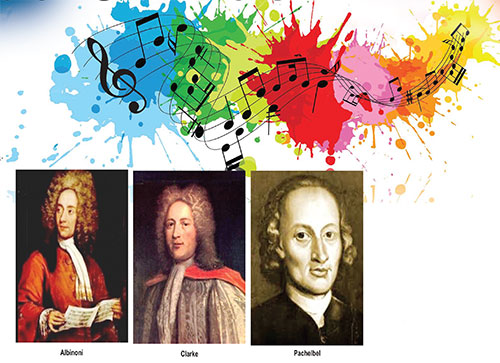
By Satyajith Andradi
Quite understandably, the world of classical music is dominated by the brand images of great composers. It is their compositions that we very often hear. Further, it is their life histories that we get to know. In fact, loads of information associated with great names starting with Beethoven, Bach and Mozart has become second nature to classical music aficionados. The classical music industry, comprising impresarios, music publishers, record companies, broadcasters, critics, and scholars, not to mention composers and performers, is largely responsible for this. However, it so happens that classical music lovers are from time to time pleasantly struck by the irresistible charm and beauty of classical pieces, the origins of which are little known, if not through and through obscure. Intriguingly, most of these musical gems happen to be classical super – hits. This article attempts to present some of these famous pieces and their little-known composers.
Pachelbel’s Canon in D
The highly popular piece known as Pachelbel’s Canon in D constitutes the first part of Johann Pachelbel’s ‘Canon and Gigue in D major for three violins and basso continuo’. The second part of the work, namely the gigue, is rarely performed. Pachelbel was a German organist and composer. He was born in Nuremburg in 1653, and was held in high esteem during his life time. He held many important musical posts including that of organist of the famed St Stephen’s Cathedral in Vienna. He was the teacher of Bach’s elder brother Johann Christoph. Bach held Pachelbel in high regard, and used his compositions as models during his formative years as a composer. Pachelbel died in Nuremburg in 1706.
Pachelbel’s Canon in D is an intricate piece of contrapuntal music. The melodic phrases played by one voice are strictly imitated by the other voices. Whilst the basso continuo constitutes a basso ostinato, the other three voices subject the original tune to tasteful variation. Although the canon was written for three violins and continuo, its immense popularity has resulted in the adoption of the piece to numerous other combinations of instruments. The music is intensely soothing and uplifting. Understandingly, it is widely played at joyous functions such as weddings.
Jeremiah Clarke’s Trumpet Voluntary
The hugely popular piece known as ‘Jeremiah Clarke’s Trumpet Voluntary’ appeared originally as ‘ The Prince of Denmark’s March’ in Jeremiah Clarke’s book ‘ Choice lessons for the Harpsichord and Spinet’, which was published in 1700 ( Michael Kennedy; Oxford Dictionary of Music ). Sometimes, it has also been erroneously attributed to England’s greatest composer Henry Purcell (1659 – 1695 ) and called ‘Purcell’s Trumpet Voluntary (Percy A. Scholes ; Oxford Companion to Music). This brilliant composition is often played at joyous occasions such as weddings and graduation ceremonies. Needless to say, it is a piece of processional music, par excellence. As its name suggests, it is probably best suited for solo trumpet and organ. However, it is often played for different combinations of instruments, with or without solo trumpet. It was composed by the English composer and organist Jeremiah Clarke.
Jeremiah Clarke was born in London in 1670. He was, like his elder contemporary Pachelbel, a musician of great repute during his time, and held important musical posts. He was the organist of London’s St. Paul’s Cathedral and the composer of the Theatre Royal. He died in London in 1707 due to self – inflicted gun – shot injuries, supposedly resulting from a failed love affair.
Albinoni’s Adagio
The full title of the hugely famous piece known as ‘Albinoni’s Adagio’ is ‘Adagio for organ and strings in G minor’. However, due to its enormous popularity, the piece has been arranged for numerous combinations of instruments. It is also rendered as an organ solo. The composition, which epitomizes pathos, is structured as a chaconne with a brooding bass, which reminds of the inevitability and ever presence of death. Nonetheless, there is no trace of despondency in this ethereal music. On the contrary, its intense euphony transcends the feeling of death and calms the soul. The composition has been attributed to the Italian composer Tomaso Albinoni (1671 – 1750), who was a contemporary of Bach and Handel. However, the authorship of the work is shrouded in mystery. Michael Kennedy notes: “The popular Adagio for organ and strings in G minor owes very little to Albinoni, having been constructed from a MS fragment by the twentieth century Italian musicologist Remo Giazotto, whose copyright it is” (Michael Kennedy; Oxford Dictionary of Music).
Boccherini’s Minuet
The classical super-hit known as ‘Boccherini’s Minuet’ is quite different from ‘Albinoni’s Adagio’. It is a short piece of absolutely delightful music. It was composed by the Italian cellist and composer Luigi Boccherini. It belongs to his string quintet in E major, Op. 13, No. 5. However, due to its immense popularity, the minuet is performed on different combinations of instruments.
Boccherini was born in Lucca in 1743. He was a contemporary of Haydn and Mozart, and an elder contemporary of Beethoven. He was a prolific composer. His music shows considerable affinity to that of Haydn. He lived in Madrid for a considerable part of his life, and was attached to the royal court of Spain as a chamber composer. Boccherini died in poverty in Madrid in 1805.
Like numerous other souls, I have found immense joy by listening to popular classical pieces like Pachelbel’s Canon in D, Jeremiah Clarke’s Trumpet Voluntary, Albinoni’s Adagio and Boccherini’s Minuet. They have often helped me to unwind and get over the stresses of daily life. Intriguingly, such music has also made me wonder how our world would have been if the likes of Bach, Handel, Haydn, Mozart, Beethoven, and Schubert had never lived. Surely, the world would have been immeasurably poorer without them. However, in all probability, we would have still had Pachelbel’s Canon in D, Jeremiah Clarke’s Trumpet Voluntary, Albinoni’s Adagio, and Boccherini’s Minuet, to cheer us up and uplift our spirits.
Midweek Review
The Tax Payer and the Tough
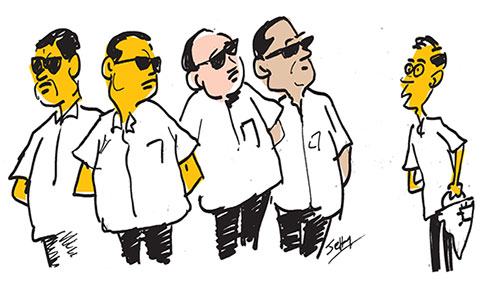
By Lynn Ockersz
The tax owed by him to Caesar,
Leaves our retiree aghast…
How is he to foot this bill,
With the few rupees,
He has scraped together over the months,
In a shrinking savings account,
While the fires in his crumbling hearth,
Come to a sputtering halt?
But in the suave villa next door,
Stands a hulk in shiny black and white,
Over a Member of the August House,
Keeping an eagle eye,
Lest the Rep of great renown,
Be besieged by petitioners,
Crying out for respite,
From worries in a hand-to-mouth life,
But this thought our retiree horrifies:
Aren’t his hard-earned rupees,
Merely fattening Caesar and his cohorts?









